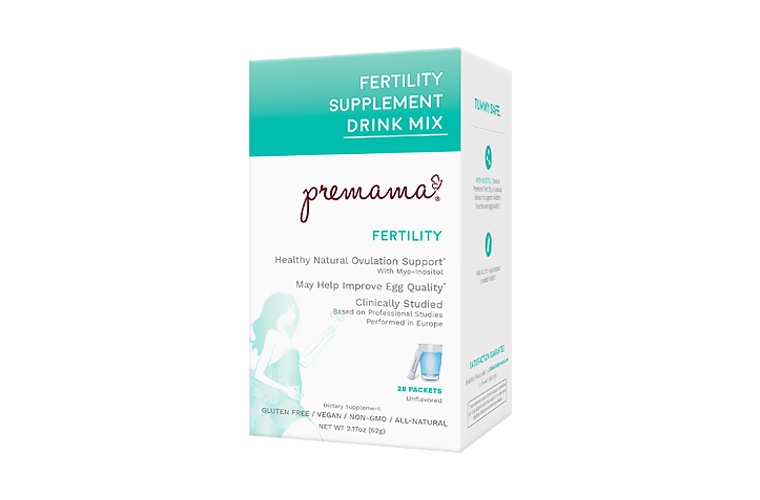3 Ways to Boost Your Fertility, Naturally
So you’re ready to start trying to get pregnant (insert excited face emoji here). Naturally, you want to take all the precautions to make sure your body is ready—but if you're already trying, you may have noticed that it can take a lot longer than you thought it would.
Why is that? Richard Chudacoff, MD, says it can be caused by a whole host of reasons—age, genetics, hormone imbalances, or physiologic conditions like endometriosis. While some of those factors require specific medical treatment, though, you can give yourself a major boost by adding supplement support—because when you're taking care of yourself and getting the nutrients you need, your body can do its thing.
That's the mission behind Premama, the innovative new brand that's rethinking the way we do prenatal vitamins. Not only do the research-backed formulas support you from pre-conception through pregnancy and birth (plus breast feeding)—they're also up-to-par with all of the superfood-level boosters you're used to adding to your morning smoothie. That means non-GMO, vegan, and delivered in an easy-to-take powder that can be mixed into any non-carbonated beverage. No more old-school horse pills? Game. Changed.
“I counsel my patients continuously to take prenatal vitamins, or fertility supplements, at least three months prior to attempting pregnancy.”
And for women who suffer from PCOS (AKA polycystic ovary syndrome)—that's roughly one in ten—Premama Fertility offers clinically tested ingredients designed to improve egg quality and ovulation. If you're dealing with the hormonal condition (which means you may have cysts on your ovaries and infertility issues), this could be the tipping point to mom-to-be status.
Whatever boat you're in, Dr. Chudacoff agrees that supplement support is essential if you're trying to get knocked up. “I counsel my patients continuously to take prenatal vitamins, or fertility supplements, at least three months prior to attempting pregnancy,” he advises.
Scroll down for more ways to give your fertility a natural boost, plus a deep dive into the supplements you need.

1. Start taking that fertility supplement now
Dr. Chudacoff definitely recommends starting your regimen three months before trying to conceive, but says you can’t start too early. So if a baby is in your foreseeable future, get to sipping that Premama Fertility-boosted smoothie (or, hey, ice cream).
The secret to Premama Fertility is one buzzy ingredient: Myo-Inositol. According to clinical trials, women with PCOS who took the supplement (a naturally occurring member of the B vitamin family) showed a significant improvement in egg quality and ovulatory function—which means it has potentially huge benefits for women across the board, even if you don't have PCOS. And according to Dr. Chudacoff, giving your eggs a boost is always a good idea.
"If you think about it logically, all the eggs are there at birth, and all the eggs are exposed to all environmental conditions that the woman is exposed to throughout her life—chemicals, radiation, etc.," Dr. Chudacoff says.
So even if you're living your healthiest life, odds are you've been exposed to some toxins that are less than beneficial for your fertility. And while you're bolstering your medicine cabinet, you should probably add a prenatal vitamin like Premama Prenatal to your regimen as well.
"This is actually incredibly important," Dr. Chudacoff says. "The folic acid in the prenatal vitamin helps decrease neural tube defects. The iron and calcium are important to increase the blood supply and maintain bone density prior to pregnancy, which often decreases during pregnancy.”

2. Take care of your physical and mental health
That means getting enough sleep, trying to keep your stress levels down, and most importantly, exercising.
"Physical and mental health are incredibly important prior to getting pregnant," Dr. Chudacoff says. "Studies showed that the women who are obese at time of conception, or have an abnormal large weight gain in pregnancy, have children that are less successful in school, and as adults, and they are prone to obesity and diabetes."
He notes that emotional stressors can affect pregnancy and its outcomes, so self-care becomes extra important when you're prepping your body for a baby. Use this as extra incentive to keep doing the things that bring you joy—go for a hike, have an at-home DIY spa day, or channel Beyoncé and rock out in a SoulCycle class. Your future mini-me will thank you.

3. Make sure your diet is on point
Make sure your body has enough nutrients to share with a little one (and to avoid the aforementioned extra weight gain). And many pregnant women have trouble with digestion, so you don't want to be eating too many foods that are tough to process.
"Intestinal motion is slowed during pregnancy. This is hormonally related," Dr. Chudacoff says. "That is one of the reasons for nausea and vomiting in pregnancy."
Because Premama prenatal supplements include magnesium, he says they can help with nausea and constipation. And he notes that iron can also cause intestinal irritation—but Premama prenatal uses chelated iron in small doses that are more effectively absorbed, which avoids added discomfort.
Overall, Dr. Chudacoff has a pretty simple formula for making sure you're eating the right things while pregnant. "There are foods that are better to eat prior to pregnancy," Dr. Chudacoff says. "I recommend the ‘recognition diet’ (if you can recognize the food and where it comes from, you can eat it: fresh fruit, fresh vegetables, fish, chicken, beef. There are no Big Mac bushes, pizza plants, taco trees, or soda springs)." Sounds like sound logic to us.
In partnership with Premama
Top photo: Stocksy/Luke Mattson
Loading More Posts...